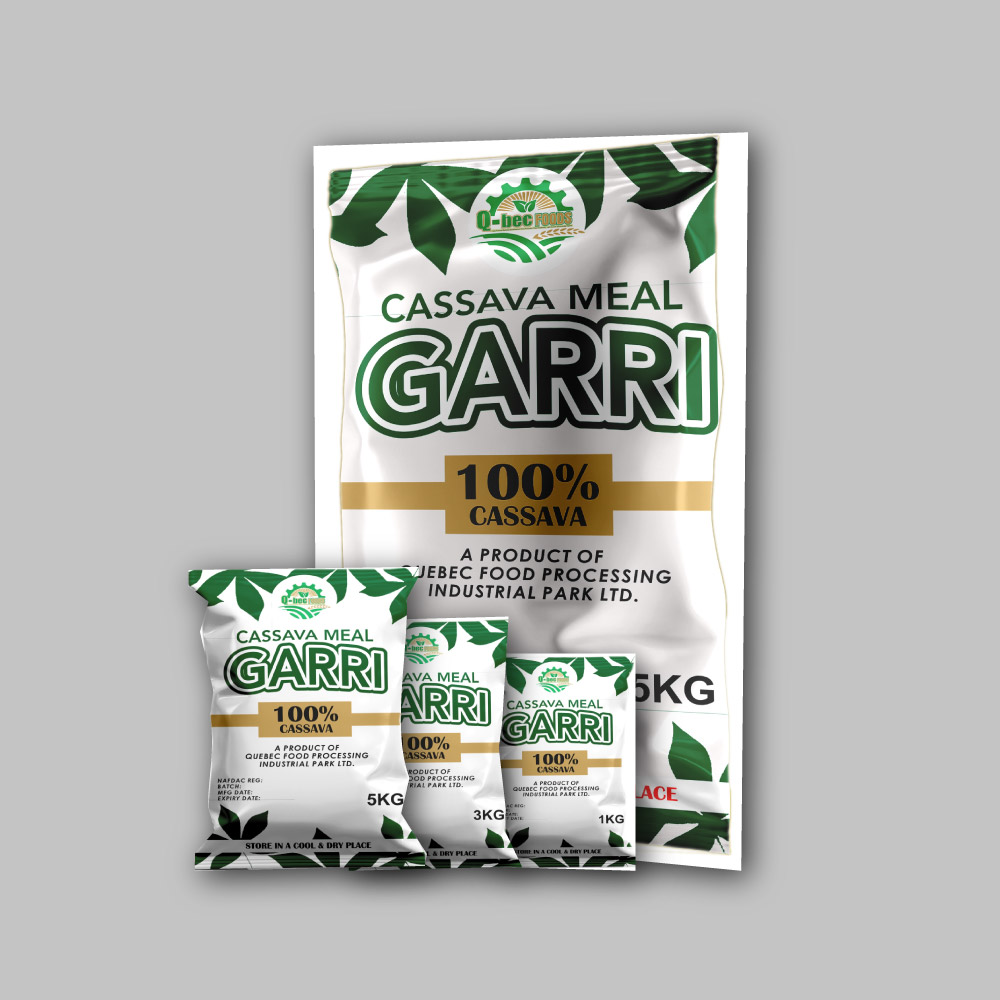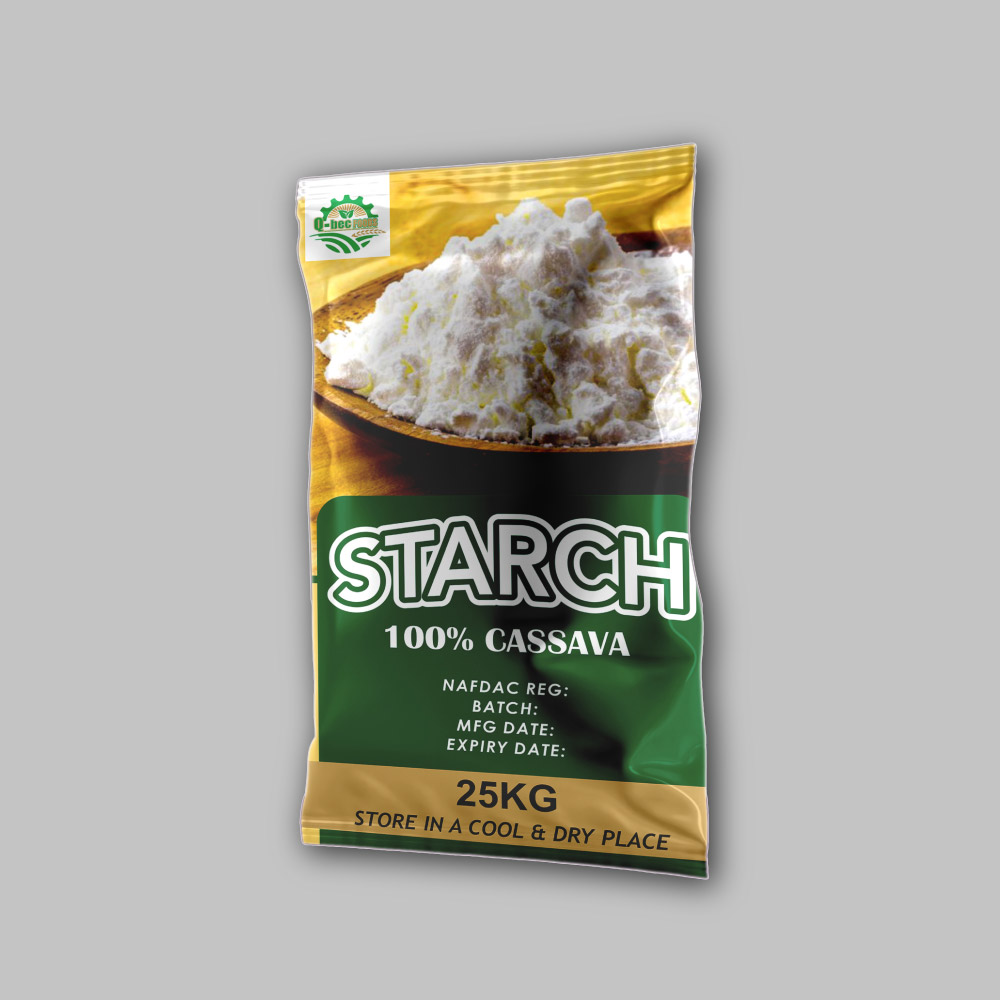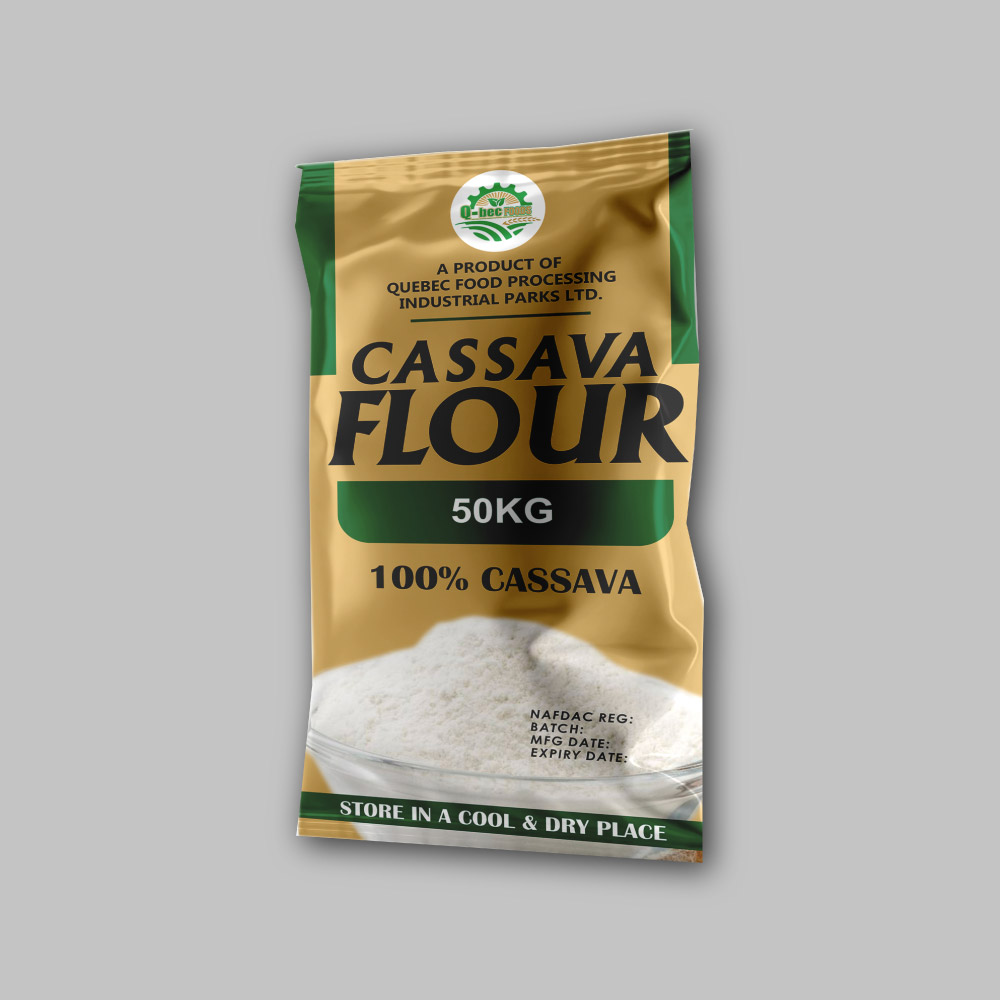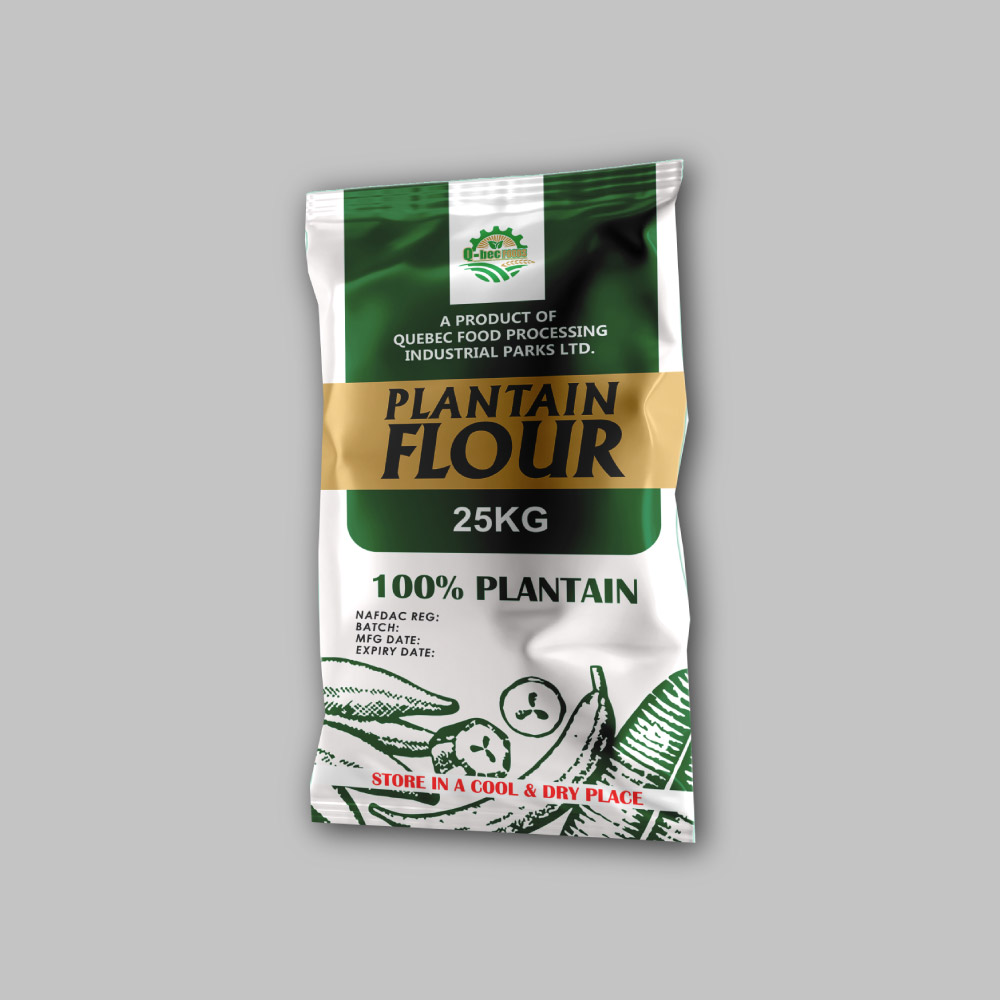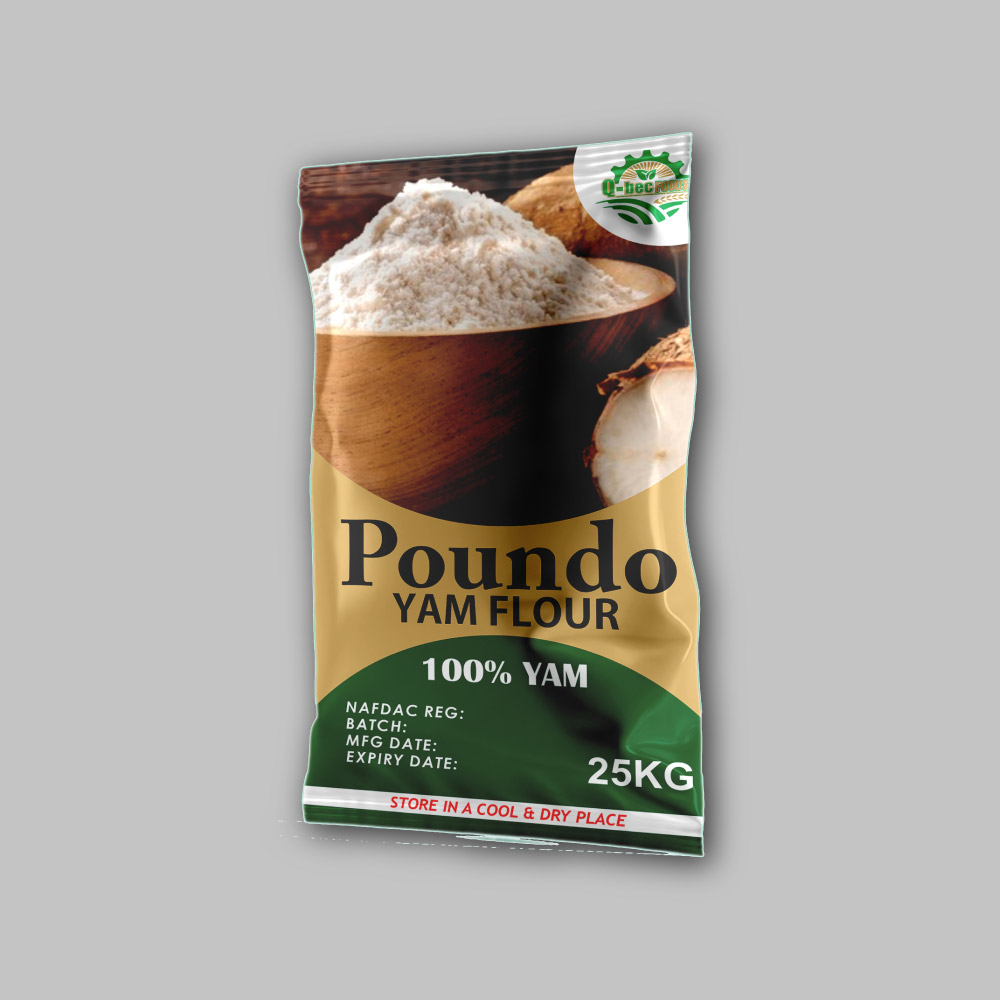About Us
Quebec Food Processing Industrial Parks Ltd is a registered private company limited by shares under the Companies and Allied Matters Act 2020 of the Federal Republic of Nigeria with RC: 1710593 and a registered trademark name: Q-BEC FOODS.
The company is established to grow, process, package, and export healthy food products, with experienced directors and an outstanding management team to pilot its affairs and operations globally.
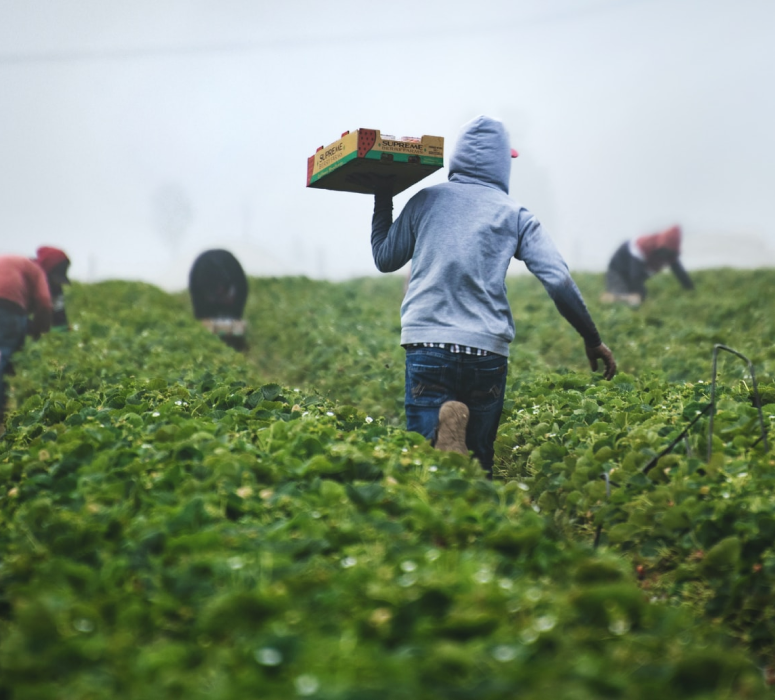
Our Mission
Our mission is to add mutual value to our partners and transformative capital to Agriculture by converting uncultivated farmlands into Farm Estates and setting up processing plants to open alternative income to all classes of investors with the core aim of driving agriculture toward sustainability on a massive scale.
Our Products
We are committed to producing, processing, packaging, and exporting healthy food products such as; highquality cassava products, fruits, vegetables, and others for local consumption and the global market.
Our Processes
We enhance Farm produce production and minimize post-harvest losses by processing, packaging for local consumption, and exporting while investors earn over medium to long term as an alternative medium of investment.
Overview
The World Trade Organisation ranks Nigeria as the largest foodstuff market in Africa, with significant investment in the local industry and a high level of imports. The food and beverage (F&B) sector comprise 22.5% of the manufacturing industry, generating an estimated 1.5 million jobs and 4.6% of the country's GDP.
In the food and beverage (F&B) sector, over 88% of Nigeria's top food and beverage companies have headquarters in Lagos State, Ogun State, Osun State, and Oyo State, each housing one company. 60% of the companies are in the food sub-sector, 28% are in beverages, with a few companies operating across both sub-sectors
There are over 50 manufacturing and distribution sub-sectors within the Food & Beverages sector. Among the top 25 companies, the most common segment in the food sub-sector is grain products, with a few food companies multi-segmented, producing a variety of foodstuffs.
In the beverage sub-sector, few companies produce unspecified non-alcoholic drinks, with some producing alcoholic drinks.
Quality standards are usually related to improving the safety of food products suitable for consumption following specifications by food regulatory bodies; these standards are necessary for international businesses and contribute to economic progress through industrial development and trade.
Quebec Food Processing Industrial Parks Ltd's business model is geared towards engaging smallholder farmers and job creation for agri-food related graduates through this sector by setting up processing plants and Mechanized Farm Estate globally, focusing on Food, Fruits & vegetable crops, with a core aim of addressing price hiking of farm produces and processed finished products globally.
Quebec Food has positioned itself to partake in the developments that are taking place across the food value chain with a core aim of becoming one of the most preferred agro-producing and agro-food processing firms that would meet worldwide market quality demand and maintain profitable cash value return (CVR) for all its investors.
The unique investment opportunities in the company are available to all classes of investors; to ensure that each processing unit and Farm Estate are fully funded and properly managed to encourage sustainability and efficiency at all levels.
As a firm, we have a mechanism in place to ensure customers in the food, beverages, confectioneries, paper, textiles, and pharmaceuticals specific requirements are achieved for their products to meet consumer’s needs globally.
Above all promoter's determination is to improve food production and processed food products through the use of the Total Quality Management (TQM) technique and the use of computerized systems to produce high-quality and high-value products with the core aim of reducing the wastage of farm produce, production time, and cost.
Infrastructure
Food Processing
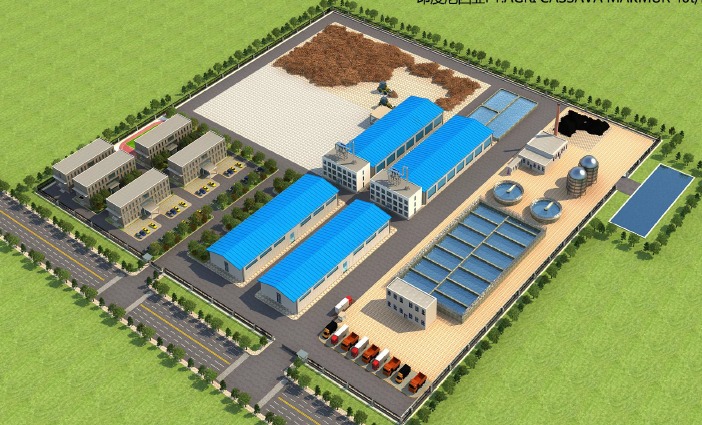
Quebec Foods has taken on the state-of-the-art technology for processing the cassava value chain, fruits, vegetables, and spices being one of the agricultural sub-sectors in West and Central Africa that has great potential in terms of improving productivity, creating added value, and developing regional trade.
The Plants design is ongoing by Zhengzhou jinghua industry co., Ltd, for processing aseptic packing of various cassava food products; While Alfa Laval Sweden is for processing & aseptic packing of various fruits and vegetables.
All Quebec Foods products will be packed directly into aseptic packs to ensure a long shelf life with complete preservatives or refrigeration where and when necessary. This is also to protect the bags against flex cracking and pinhole damage.
All processing operations like extraction, refining, concentration, sterilization, and aseptic packaging are automatic and take place in sealed systems for total hygiene.
Computerized process controls are put in place to ensure continuous maintenance of parameters that are essential to the preservation of color, flavor, and taste, to meet international standards.
Food Production
Quebec Foods has designed an Integrated Mechanized Farm Estates model to create a sustainable linkage with smallholder farmers and growers of agro-farm produce by adopting innovative practices like contract farming across the states and communities within and outside processing hubs based on mutual trust and understanding.
Our model ensures complete traceability of the farm produce from the farmer's and grower's fields during production to the storage facility for processing; this is a highly desirable phenomenon in the food industry.
Products
Quebec Food Processing Industrial Parks Ltd has distinguished itself with a registered trademark “Q-BEC FOODS” to bridge the gap in the processing of various cassava multiples of food products, including Garri (Fried Cassava Granules), Fufu (Cassava Dough), Lafun (Fermented Cassava Flour), Tapioca (Cassava Flakes), High-Quality Cassava Starch (HQCS), High-Quality Cassava flour (HQCF), animal feed, alcohol, starches for food, beverages, confectioneries, paper, textiles, adhesives and in pharmaceuticals;
Q-bec Foods is determined to bridge the gap in processing Fruits & Vegetables into Pulses, Pastes, and Concentrates, and blend juice across countries and International markets to the desired specifications of the customer's requirement.
Quality Assurance
All Q-bec Foods products will be certified by the following regulatory bodies:
- National Agency for Food & Drug Administration & Control (NAFDAC)
- DNV (Det Norske Veritas), one of the world’s leading certification bodies/ registrars, as being ISO 22000:2005 compliant.
- Complied with the codex HACCP principles and provides a framework for third party certification.
- SEDEX compliant company is to have a strong customer base both nationally & internationally.
- KOSHER for customers from Israel, Germany, USA & Canada.
Q-BEC FOODS will also identify with the VOLUNTARY CONTROL SYSTEM of SGF.
SGF Certification is obligatory for the exports to European Customers.
These processes are on-going to ensure we have stringent management policies in place.
Partnership
Anchor Investors & Private Partnership
Q-bec Foods have initiated plans to welcome Anchor Investors, angel investor, Equity – Investor and venture capital investors to invest in Q-bec Agritech City & Farm Estates Project sites across the selected zones in Nigeria. This is to ensure the vision laid out by its promoters of the ongoing development plans for Q-bec Agritech City & Farm Estates project model is achieved across Africa, Asia, Europe and North America.
Government Agriculture Intervention Programmes.
Our promoters aim to contribute to nation-building through Integrated Mechanized Farm Estates and Processing Plant investment model by liaising with the Governments of countries of interest and supporting their food security initiatives through the cultivation of a minimum of one million hectares of arable farmland, engaging 2 million Farmers across such countries with the expectation of producing about 6 million metric tonnes of food Product Equivalent (FPE) annually over the medium to long term.
Discover More
